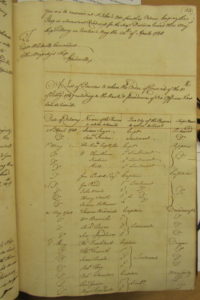In today’s post, we’re looking at CAL/6, the Orderbook of Admiral Sir Henry Osborn, covering the years 1747-1757. This is one volume in a series of papers collected by the Caldwell family and donated to the National Maritime Museum together.
Admiral Sir Henry Osborn served in that crucial period from approximately 1710 to not quite 1760. This book coontains copies of his orders, rather than a collection of the physical orders themselves. Many are from Osborn to the captains of various ships under his command. During this period, Osborn was in command of fleets in the Channel, Atlantic and Mediterranean. This volume actually includes orders from just immediately prior to the Battle of Cartagena (Spain), where the Royal Navy defeated the Spanish (and redeemed themselves in their own eyes for the loss of Minorca).
Unfortunately, this volume does not contain any of his orders from his time as Commodore-Governor of Newfoundland in the early 1720s. However, this is an absolutely fascinating set of documents, a critical resource for anybody researching Osborn, Royal Navy command and control practices, or the Royal Navy during the War of the Austrian Succession.
I have 130 images of this volume, including one of the spine of the volume. This is not a complete set of the entire volume, and only cover the orders up until September 1st 1748.










Can’t wait to get into it. I am just learning about the Austrian War of Succession. The lacking of the American education system. I just retired from the Civil Service. and have been involved with Instructional Design since 84. I love history, particularly military history. I am working on a web site on the Royal Navy during the Georgian age. I am a big believer in adding to the body of knowledge available to people on the Internet.
Dear Kevin,
At present I am working on prize agency in the 1739-48 war. Martin Wilcox has published an essay on agency in the late eighteenth century, but the only other work I know of is JS Bromley’s essay on Portsmputh using the Drakeford papers at the Staffordshire County Record Office. This is an extensive collection, though as Rodger says, little used. It is especially interesting because it does not depend on the ‘official’ correspondence, ships’ logs, HCA records, etc. I am trying to complete an essay on agency in the 1740s though it is regretable current closure of archives means I will have to postpone further research for a while. If there is some particular aspect of the war at sea in the 1740s let me know and I’ll see if I aave any relevant transcripts.
From some of my readings I am wondering if command and control was as messed up as it seems. Admirals ignoring superior officers. The party politics. My first job in the UK was at the Royal Military college working on course work for captains. It was funny, I was the only civilian working on the project with any military experience. But in the wrong military. SO I got the assignments for command and control. As I read books either the authors write it in or there was a server problem.
Messed up is.. a way too simplistic way of putting it. Command and Control was absolutely decentralized- both within the institution, and within squadrons/fleets. If you look at my PhD thesis (The Westminster Model Navy. available on this site as a PDF), there’s a few good things about it in the bibliography.